
Kārlis Augusts Vilhelms Ulmanis was a Latvian politician. He was one of the most prominent Latvian politicians of pre-World War II Latvia during the Interwar period of independence from November 1918 to June 1940. He served four times as prime minister, the last time as the head of an authoritarian regime, during which he subsequently also adopted the title of President of Latvia. The legacy of his dictatorship continues to divide public opinion in Latvia today.

Jānis Kristaps Čakste was a Latvian politician and lawyer who served as the first head of an independent Latvian state as the Chairman of the People's Council (1918–1920), the Speaker of the Constitutional Assembly (1920–1922), and as the first President of Latvia (1922–1927).
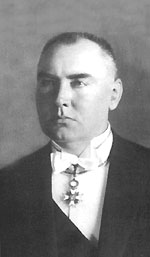
Alberts Kviesis was a Latvian politician and the third President of Latvia.
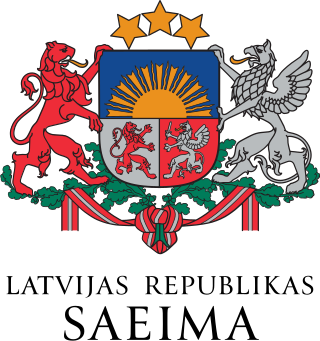
The Saeima is the parliament of the Republic of Latvia. It is a unicameral parliament consisting of 100 members who are elected by proportional representation, with seats allocated to political parties which gain at least 5% of the popular vote. Elections are scheduled to be held once every four years, normally on the first Saturday of October. The most recent elections were held in October 2022.

Anatolijs Gorbunovs, also known as Anatoly Valeryanovich Gorbunov, is a Latvian politician who served as the Chairman of the Supreme Soviet during the final years of the Soviet regime in Latvia and as Chairman of the Supreme Council of Latvia during the first years after the country regained its independence.

The Declaration "On the Restoration of Independence of the Republic of Latvia" was adopted on 4 May 1990 by the Supreme Soviet of the Latvian SSR in which Latvia declared independence from the Soviet Union. The Declaration stated that, although Latvia had de facto lost its independence in 1940, when it was annexed by the Soviet Union, the country had de jure remained a sovereign country as the annexation had been unconstitutional and against the will of the Latvian people. It asserted the priority of the basics of the international law over the national laws and therefore it resolved that the Molotov–Ribbentrop Pact and the Soviet occupation of Latvia in 1940 were illegal. It also asserted that the heavily rigged 1940 elections were illegal and unconstitutional, and that all acts of the People's Saeima chosen at that election–including the request to join the Soviet Union on 21 July 1940–were ipso facto void.

The president of Latvia is head of state and commander-in-chief of the National Armed Forces of the Republic of Latvia.

Indirect presidential elections were held in Latvia on 2 June 2011. Incumbent president Valdis Zatlers was standing again, as well as Andris Bērziņš, a former head of SEB Unibanka ; Bērziņš was nominated by five Saeima members of the Union of Greens and Farmers just two days before the nomination deadline, although the party was assumed to back Zatlers for reelection.
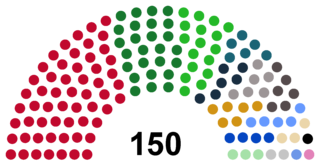
The Constitutional Assembly of Latvia was independent Latvia's first elected legislative body. Its main task was creating the constitution of Latvia, the Satversme, which is still in effect to this day. The Speaker of Assembly was Jānis Čakste, who later became the first President of Latvia. The assembly functioned from May 1, 1920, until November 7, 1922, when the 1st Saeima convened.

Indirect presidential elections were held in Latvia on 3 June 2015. Raimonds Vējonis of the Green Party was elected President and took office on 8 July. According to the European Green Party, he is the first of their members to become a head of state of a European Union member state.

2nd Saeima was the parliament of Latvia from November 3, 1925, until November 5, 1928. The Social Democrat Pauls Kalniņš continued to hold the post of Speaker of the Saeima to which he was first elected during the 1st Saeima.
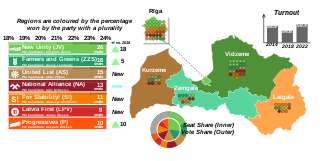
Parliamentary elections were held in Latvia on 1 October 2022, following the end of the term of the 13th Saeima elected in 2018.

Indirect presidential elections were held in Latvia on 29 May 2019.

Indirect presidential elections were held in Latvia on 20 June 2003. The incumbent, Vaira Vīķe-Freiberga, was re-elected by the Saeima to serve a second four-year term with an overwhelming majority.

Pauls Kalniņš was a Latvian physician and politician (LSDSP), a long-term Speaker of the Saeima, one of the signatories of the Memorandum of the Central Council of Latvia in 17 March 1944, and was the Acting President of Latvia.
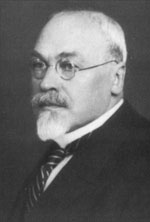
The 1927 presidential elections in Latvia took place in April 5, 7, and 8, 1927, during the term of the 2nd Saeima. The elections took place in extraordinary circumstances, as the former President of Latvia, Jānis Čakste, had died while holding the office of President. The election of the president this time proved to be very difficult as only after nine unsuccessful votes in three Saeima sittings for the 2nd President of Latvia was Gustavs Zemgals elected.

The 1930 presidential elections in Latvia took place in April 8 and 9, 1930, during the term of the 3rd Saeima. Incumbent president Gustavs Zemgals refused to run again, so, like in the 1927 elections, many rounds of voting were required until the Latvian Farmers' Union candidate Alberts Kviesis was elected president and became the 3rd President of Latvia.

The 1993 presidential elections in Latvia took place on July 7, 1993. It was the first presidential election after the restoration of Latvia's independence. Guntis Ulmanis was elected the 5th President of Latvia.

The 1996 presidential elections in Latvia took place on June 18, 1996. Guntis Ulmanis was re-elected President of Latvia. According to the Satversme, the President was elected by the 6th Saeima.

The 1999 presidential elections in Latvia took place on June 17, 1999. After no candidate collected the required number of votes in several ballots, a break was announced at the election session, during which Raimonds Pauls, who had received the most support at the time, withdrew his candidacy. After the break, the sitting was resumed with new candidates and Vaira Vīķe-Freiberga was elected the 6th President of Latvia.




















